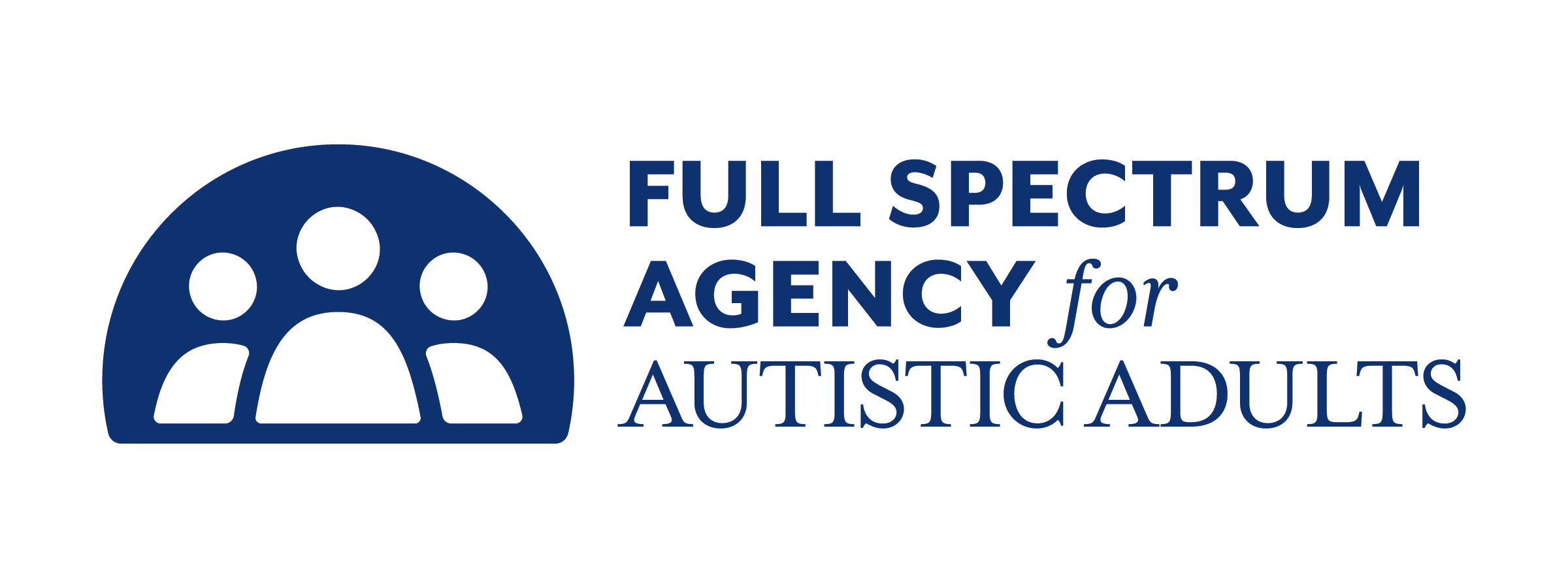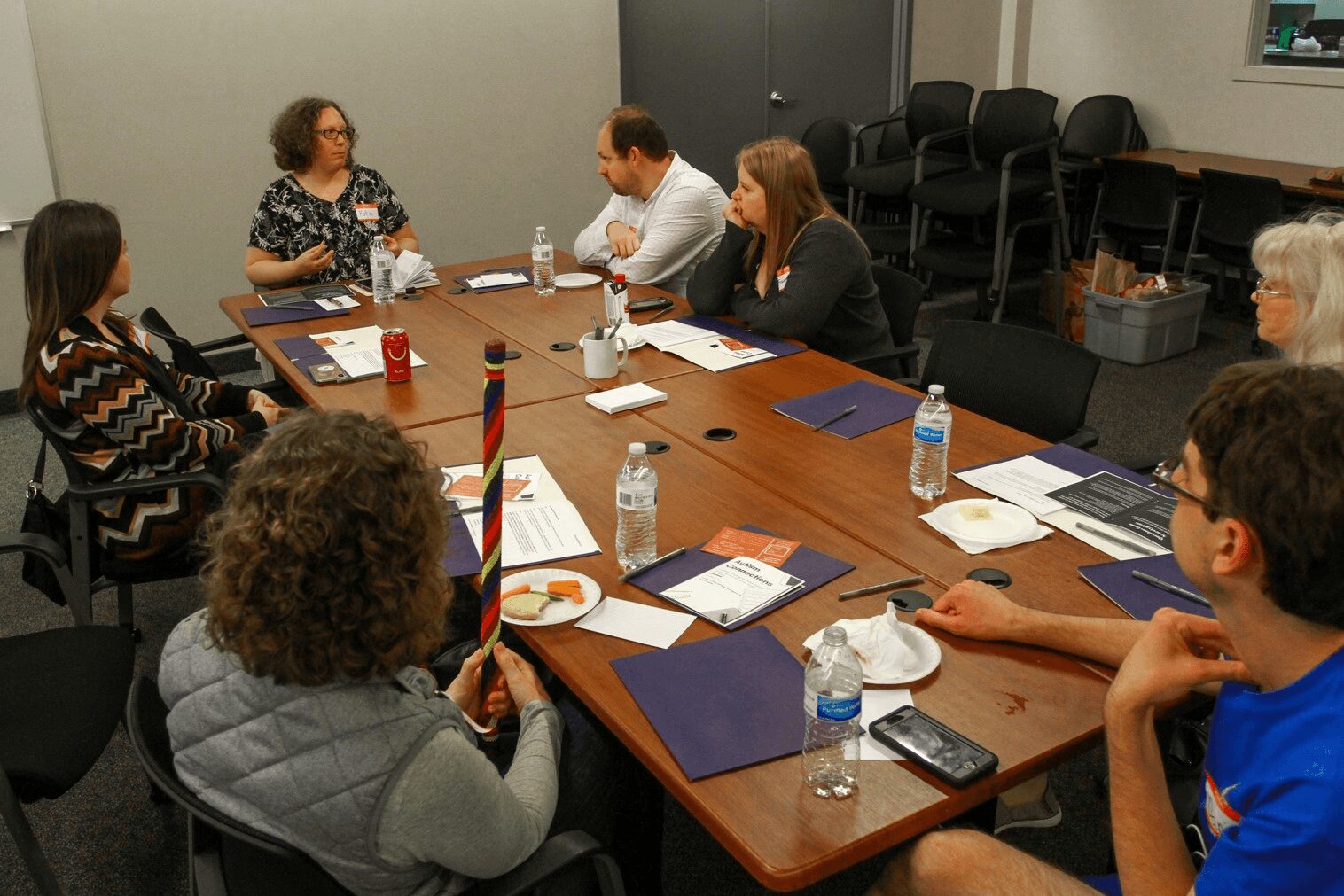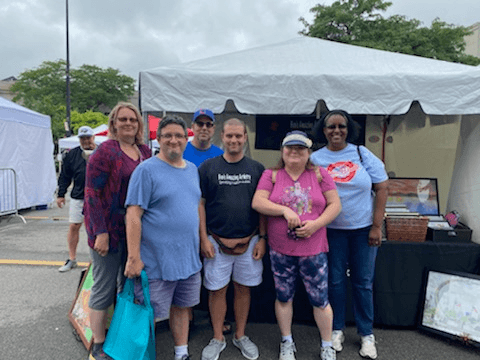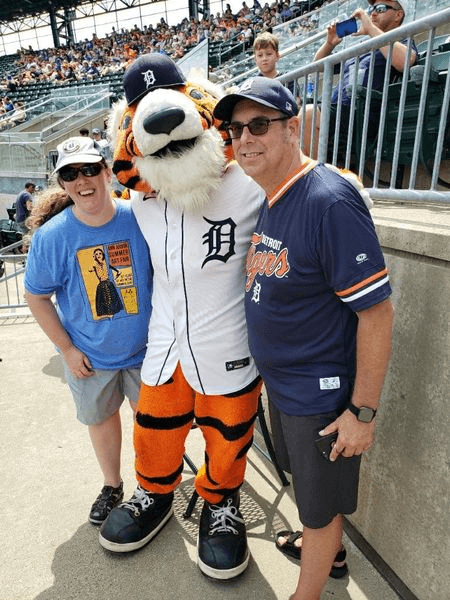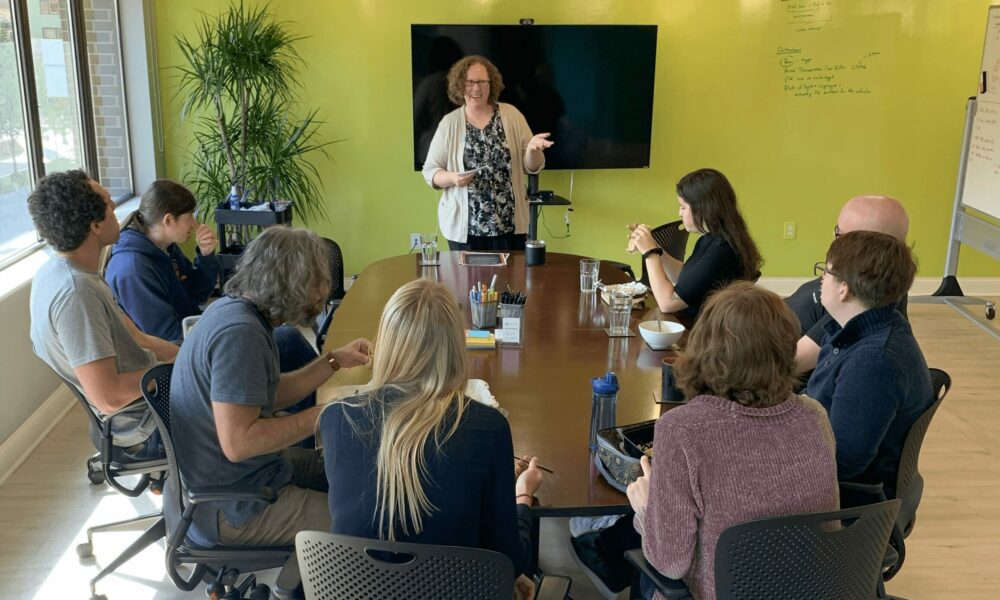

Today we’d like to introduce you to Katie Oswald
Hi Katie, so excited to have you on the platform. So before we get into questions about your work-life, maybe you can bring our readers up to speed on your story and how you got to where you are today?
I never thought I would be the founder of a nonprofit organization. I was diagnosed with autism at age 38 and I was looking for programs and community for autistic adults, but I couldn’t find any, so I decided to start it myself.
Leading up to my diagnosis, I struggled quite a bit with things I didn’t understand at the time, like sensory overload, meltdowns, shutdowns, and autistic burnout. I did well in school, but I couldn’t handle being there around so many people for such long hours. It was a sensory nightmare. Years of chronic overwhelm caught up with me in high school and I started shutting down. I was having frequent meltdowns that were frightening for me and for those around me. We didn’t understand at the time that it was caused by sensory overload. We thought it was a behavioral or emotional disturbance. I barely graduated from high school, despite doing extremely well in school before that. People thought I wasn’t trying, but I was doing the best I could and trying to not collapse from exhaustion.
The collapse came almost a year after graduation in the form of autistic burnout, which we also didn’t know about at the time. Some days it took all the energy I had just to get out of bed. When you are severely shut down like that, it’s like you are a zombie. It felt like I was trying to move through a wall of wet cement and sometimes when people were talking to me, I heard the sound, but couldn’t understand the words. Sometimes I didn’t have enough energy to speak.
Autistic burnout can look a lot like severe depression, but the cause is different. It happens from chronic overload over an extended time. Autistic people tend to go into fight or flight response easily and frequently because we process the world in a lot more detail, which can sometimes feel like a sensory attack. It’s not good for someone to be in this state frequently or over long periods of time. That is a primary cause of autistic burnout for many autistic people, and that was what happened to me. Autistic burnout often lasts at least three months. My burnout lasted over three years, and I have peers who have been in burnout for even longer than that.
I didn’t think I would ever recover, I just thought that’s what my life would always be like. But after a lot of down time for recovery over those three years, I eventually felt better. After easing my way back into community college, one class at a time, I eventually raised my GPA up enough to transfer to Michigan State, where I earned a degree in statistics. I did my master’s in applied economics and statistics at Clemson University and served for two years in the U.S. Peace Corps in Uganda. I felt that if I could accomplish all that, there is nothing I couldn’t do.
What I didn’t realize is that these were all things where it was relatively easy to set my own schedule and take breaks when I needed to, but a full-time job would be just like those long days at school, but without the summer vacation. I tried two different jobs over the next two and a half years, but I couldn’t make it work. Being at work took all the energy I had. I needed my evenings and weekends to myself for recovery, which caused me to become extremely isolated. It was not only unhealthy for me to be that isolated, but it was also just a matter of time before I wore myself out and collapsed into burnout again. I didn’t want to go through another three years of that, so I quit my job and made two unsuccessful attempts to start my own business. I learned a lot from both of those experiences, so when another opportunity presented itself to me, I was ready.
My third attempt at launching a business was successful and it was something I was truly passionate about. After being diagnosed as autistic, my life started making more sense, but I needed somewhere to go to learn from other autistic people. There are a lot of great blogs and books by autistic writers, but I needed to feel a sense of belonging with real people that I knew personally. I couldn’t find that, so I started that community myself. There were so many other autistic people looking for that community that people just flocked to it. I didn’t set out to start a business, but it made sense to make it a 501c3 nonprofit business.
Here we are over five years later still going strong and expanding rapidly. We have over 1,000 members in two chapters – Michigan and Massachusetts. But our members come from all over the world.
Alright, so let’s dig a little deeper into the story – has it been an easy path overall and if not, what were the challenges you’ve had to overcome?
It was really stressful to not understand why I was struggling. It was especially difficult to go through three years of burnout, come out of it with my degrees and two years of Peace Corps service, only to realize that a traditional career wasn’t going to work for me. It was a bit like starting over at that point, at 37 years old. My first two attempts at starting a business were not successful. That was a particularly challenging time, because I already knew the traditional career didn’t work and it felt like I was going to fail at entrepreneurship, too. What else is there? I’m single, so I need to be able to support myself.
Luckily, I was getting the support I needed at this time. I was able to move back in with my parents, who are very supportive; I was going to a therapist who was knowledgeable about autism; and I was able to get correctly diagnosed, finally.
Because I had this support, when I decided to start a meetup group for autistic adults, I was able to make it happen. I think the most important thing was that I felt emotionally safe. If I don’t feel safe, I can’t focus my energy on work and goals because my brain is in survival mode. I think this is a universal human experience, so I’m not sure why we don’t value emotional safety in our culture.
The next set of challenges I had were managing my time when I was “wearing all of the hats” for my organization. About 60% of our members are at or below the poverty line, and many of them have been disowned by their family, so it is important that our programs are free. That means needing to fundraise to keep things going. For the first few years, it was pretty much me doing everything myself. I was the program manager, the executive director, the board chair, and I had to do all the fundraising, marketing, and outreach. It was around this time I realized how much effort would need to go into fundraising if there was any hope of raising enough to pay myself a salary.
Unfortunately, when I dedicated that time to fundraising, our programs suffered. I decided that our programs were more important and accepted that I would be a volunteer for now, working 60+ hours per week and investing my own money on top of that. This is the experience of most entrepreneurs, I think. You typically invest a lot of your own time and money and don’t get to pay yourself a salary for the first few years.
As our members became more engaged, we started shifting more toward a cooperative model, where our members became volunteers, donors, and even board members. We finally received some grants, and some of our volunteers became paid contractors. We hope to keep this momentum going as we expand.
The most important thing will always be the wellbeing of our members. With the challenges of poverty and social isolation, we absolutely can’t leave anyone behind simply because it is difficult to get funding.
We’ve been impressed with Full Spectrum Agency for Autistic Adults, but for folks who might not be as familiar, what can you share with them about what you do and what sets you apart from others?
Full Spectrum Agency is an autistic-led nonprofit, by and for autistic adults. We welcome all autistic adults, with or without a diagnosis and regardless of support needs. We offer a variety of programs, including peer support group, body doubling (a co-working meetup for people with executive functioning challenges), book club, discussion group, ally events, and a variety of in-person social engagements. We do tabletop gaming, full day potluck picnics during the nice weather, bonfires and hayrides, Tigers games, art fairs, walks, museums, etc. Whatever our members want to do, we try to do it as a meetup.
We launched a Massachusetts chapter led by Christine Sunnerberg, who leads in-person events in the Boston area. We also launched an ally group and are welcoming non-autistic/allistic members into our Full Spectrum family.
More recently, we received a grant from NEXT For AUTISM to launch a timebank program and virtual community platform. The virtual community is hosted on Circle and is called Full Spectrum Virtual Village. One thing I miss about being in the Peace Corps is having that village support network. We don’t prioritize community in our culture, and I realized our Full Spectrum family is my “village”. Now we have a virtual village, too.
The timebank is managed by our member Susan Robinson and will be a platform for our members to provide one-on-one support for each other. Where programs like peer support and body doubling allow us to meet as a group and provide emotional support, the timebank will allow members to connect more easily with each other for support. It can be virtual or in-person and won’t be limited to emotional support. Some of our members may want to help each other with gardening, grocery shopping, housework, etc. The timebank will allow us to host group projects for community building and engage other community organizations for mutual support.
The timebank will launch this Fall and we are so excited for this next chapter in our story!
I also want to mention that we started a statewide autistic adult committee, MiA3, with 20+ members across Michigan. We are working closely with Michigan Autism Council to advocate for the needs of autistic Michiganders and guide the decisions made that affect our lives. We’ve held two committee meetings to date and are in our infancy stage. We intend to survey autistic people all over the state to learn about unmet needs, priorities, and potential solutions to report to state leaders.
What sort of changes are you expecting over the next 5-10 years?
I certainly hope we see big shifts! My hope for the future is that there will be no need for programs like those we offer at Full Spectrum Agency because inclusion of autistic people becomes the norm.
There is a lot more awareness of autism now than there was ten years ago, but we are still working on acceptance and inclusion. I hope to see acceptance of autism in my lifetime. One of the greatest challenges to autism acceptance is the medical industry’s view of autism as a disorder or something that needs to be “fixed”. The autism therapy industry is a multi-billion-dollar industry that unfortunately has an interest in the world viewing autism as a disorder.
It’s true that there is a need for therapy and intervention for some conditions that tend to be co-occurring with autism, like intellectual disability, epilepsy, gastrointestinal issues, pica, anorexia, anxiety, depression, and PTSD. But it’s important not to confuse that with autism itself. A lot of therapy for autism still focuses on trying to get a person to suppress their autistic traits and characteristics in favor of appearing more neurotypical. Many of us view our autism as an important part of who we are. There is nothing inherently harmful or damaging about autism. It is not a disease.
Therapies that focus on suppression of our true self can be harmful. An example that is likely more familiar is gay conversion therapy, which is thankfully being banned in more places. This type of therapy is unfortunately still the norm for autistic people. I think this will take a long time to change because people are making so much money.
With more acceptance and inclusion, we will see fewer bad outcomes. Right now, there is 80-90% unemployment in the autistic community, even among those of us with advanced degrees. Many are in poverty or even becoming homeless. In addition to the workplace exclusion, the general society exclusion leads to poor mental health outcomes, including severe anxiety, depression, PTSD, and suicidal ideation. True acceptance and inclusion will lead to better outcomes for autistic people.
In the meantime, we need more funding to go to programs to help people with these issues. At Full Spectrum we are interested in the possibility of autistic-led cooperative housing. We are researching these possibilities, and we hope others are also dedicating time to programs like this. There is a lot of funding for autism, but most of it goes to medical research. While it may be interesting to understand why we are autistic, it doesn’t help us live a better life. We need direct services for that.
I think we are starting to see a shift in funding priorities, but it will take longer than 10 years to get where we need to be.
Contact Info:
- Website: https://fullspectrumasd.org/
- Other: https://www.meetup.com/Full-Spectrum-Agency-Autistic-Adults/
